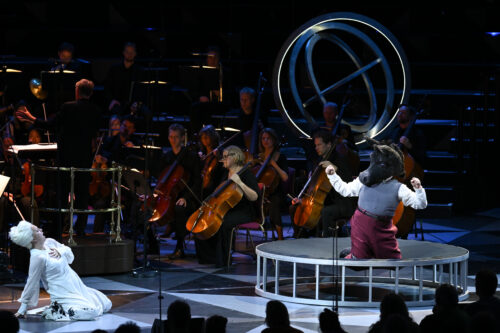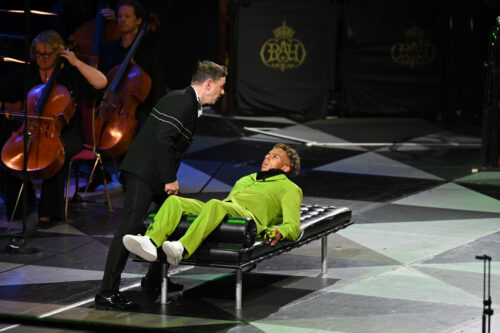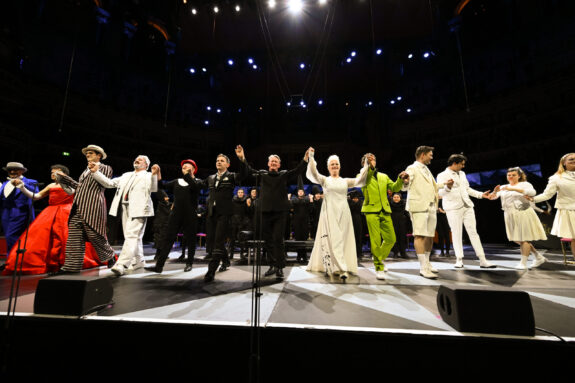
 United Kingdom PROM 68 – Garsington Opera’s A Midsummer Night’s Dream: Soloists, Garsington Opera Youth Company, Philharmonia Orchestra / Douglas Boyd (conductor). Royal Albert Hall, London, 10.9.2024. (KMcD)
United Kingdom PROM 68 – Garsington Opera’s A Midsummer Night’s Dream: Soloists, Garsington Opera Youth Company, Philharmonia Orchestra / Douglas Boyd (conductor). Royal Albert Hall, London, 10.9.2024. (KMcD)

Cast:
Iestyn Davies – Oberon
Lucy Crowe – Tytania
Daniel Vening – Bottom
Caspar Singh – Lysander
James Newby – Demetrius
Stephanie Wake-Edwards – Hermia
Camilla Harris – Helena
Nicholas Crawley – Theseus
Christine Rice – Hippolyta
John Savournin – Quince
Frazer Scott – Snug
James Way – Flute
Geoffrey Dolton – Starveling
Adam Sullivan – Snout
Jerone Marsh-Reid – Puck
This was an evening of firsts. Garsington Opera were making their BBC Proms debut, and Britten’s magical Shakespearian opera (or at least the vast majority of it – more on that later) was being performed here for the very first time.
It is hard to imagine, given this exemplary performance, that initially Britten’s enchanting score was met with a certain amount of indifference, being labelled effete, fey and fragile when it premiered in 1962. These days, and rightly so, his reworking of Shakespeare’s play, (with Peter Pears as his co-librettist) is hailed as a masterpiece, and belongs aside Verdi’s Otello and Falstaff as the finest operatic adaptations of a Shakespeare play.
There was one minor quibble with this performance, however, so let us get that out of the way now. The opera was given with a sizable cut in the second act – Bottom’s ‘I have a reasonable good ear in music. Let’s have the tongs and the bones.’ This came as a surprise, as I have never seen a staging before where this happened. I can only deduce that it was due to length, but it is only a few minutes long so its excision seemed unnecessary.
Other than that, this semi-staging by Rebecca Meltzer, based on Netia Jones’s production that was seen at this year’s Garsington Festival gave unalloyed joy. Props were kept to the minimum – a chaise longue took pride of place on the forestage where most of the action took place, with the orchestra placed behind it. Mood was captured with a constantly changing diorama of light projections behind the orchestra.
Douglas Boyd brought out all the iridescent colours of Britten’s otherworldly score, and the playing of the Philharmonia Orchestra was beyond reproach. I have never heard so much instrumental detail – one of the benefits of an opera orchestra not being in a pit – cementing my view that this is one of Britten’s most innovative and beguiling works.

The cast, with one notable exception, had all appeared in the run at Garsington this summer, so were well and truly embedded into their roles. Iestyn Davies is the leading Oberon of our day, and his limpid, ethereal voice fits the role like a glove, even if it does lie low for today’s countertenors. He was ably partnered by Lucy Crowe’s bewitching Tytania who used her silvery-voiced instrument to telling effect, caressing Britten’s vocal lines, even in the stratospheric reaches of the part.
There was a nicely-delineated quartet of lovers led by James Newby’s forthright Demetrius – his golden baritone showing enormous promise. He is clearly a singer to watch, as is Stephanie Wake-Edwards whose rich, vibrantly-coloured mezzo-soprano helped bring Hermia to dramatic life. Camilla Harris was a winning Helena, while Caspar Singh’s honeyed tenor completed the quartet as an endearing Lysander.
Replacing an ailing Richard Burkhard at short notice, Daniel Vening won all hearts, and the loudest ovation of the night, as a lovable, and generously sung Bottom. Not only did he fit into the ensemble like a glove, Vening dominated proceedings from start to finish – the character was wonderfully etched, and he sang like a hero. Still an opera student at The Royal Academy of Music, this hugely gifted young singer clearly has a major career ahead of him. A star was well and truly born.
There were no weak links in the rest of the cast, with James Way in particular making a notable impression as Flute – his Joan Sutherland-esque Thisbe in the final act’s play had the audience in stitches, as did the rest of the ‘rude mechanicals’ that included John Savournin’s saturnine Quince (who had more than a passing resemblance to Jacob Rees-Mogg), Geoffrey Dalton’s put-upon Starveling, Adam Sullivan’s hilarious Snout and Frazer Scott’s lovable Quince. Christine Rice was sumptuous casting as richly-toned Hippolyta, while Nicholas Crawley was a forthright, if inexplicably inebriated Theseus – the staging’s only misfire.
The fairies were gloriously sung by the Garsington Opera Youth Company, whilst Jerome Marsh-Reid brought bags of vitality, personality and athleticism to the role of Puck.
All in all, this was an evening of musical magic. It took over 60 years for Britten’s masterpiece to appear at the Proms – let us hope we do not have to wait that long for its return.
Keith McDonnell
Featured Image: the cast of Garsington Opera’s A Midsummer Night’s Dream © BBC/Chris Christodoulou

This is a well written and totally accurate critique of Garsington’s BBC Proms performance at the Royal Albert Hall on Tuesday evening! A thoroughly enjoyable and beautifully performed presentation of Britten’s opera. The playing of the orchestra and singing of the entire cast was outstanding, as was young Daniel Vening’s very last minute stand in performance of Bottom! A privilege to witness, and a singer actor who will go far in the future! Well done Garsington Opera